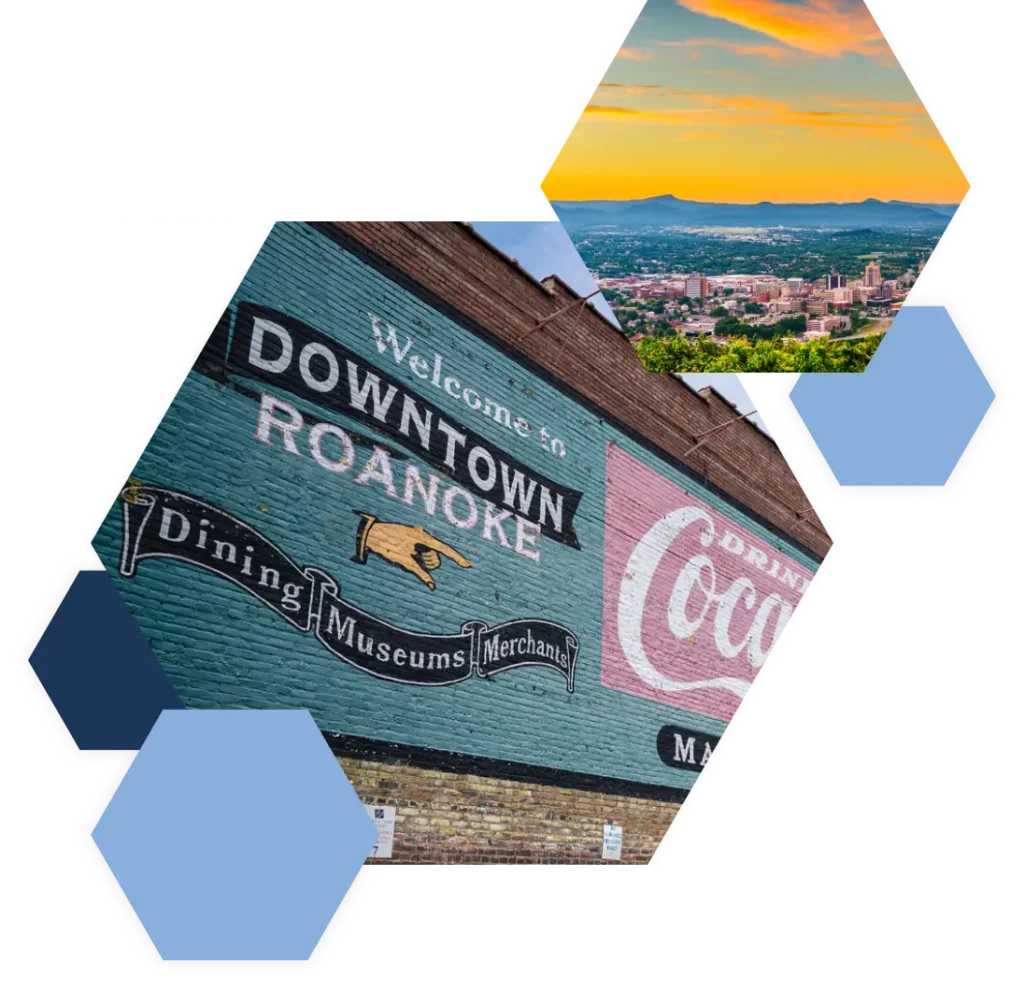If you are in the Roanoke, VA, area and need help with drug and alcohol addiction – call (704) 248-8561.

Roanoke, Virginia, is a vibrant city with historical, cultural, and natural attractions. Nestled in the Blue Ridge Mountains, Roanoke offers stunning scenic beauty and a deep-rooted history. The city is known for its diverse cultural experiences, including the Taubman Museum of Art, the Mill Mountain Theatre, and the Roanoke Symphony Orchestra. Roanoke features a thriving healthcare industry, an expanding tech sector, and a strong sense of community. These qualities make Roanoke an attractive place to live.
Like many communities, Roanoke faces challenges with addiction and mental health disorders, ranging from mild to severe. Roanoke addiction treatment centers provide a variety of substance abuse treatment options tailored to meet everyone’s needs. When beginning a program for addiction treatment in Roanoke, VA, you will find dedicated teams offering guidance, promoting community-based support, and much more, aiding you on your journey to sobriety.
Roanoke, Virginia, offers a variety of addiction treatment facilities providing comprehensive drug and alcohol treatment services tailored to meet individual needs. These programs aim to help individuals achieve long-term sobriety through personalized plans. The available treatment modalities include:
Inpatient Rehabilitation: Inpatient rehab programs in Roanoke offer intensive, round-the-clock care in a residential setting. Patients stay at the facility for the entire treatment duration, typically ranging from 28 days to several months. These programs provide structured therapy, medical supervision, and support to help individuals safely detox and address underlying issues contributing to their addiction.
Outpatient Treatment: Outpatient programs allow individuals to receive treatment while living at home, making it suitable for those with less severe addiction or those who have completed inpatient treatment and need ongoing support. Outpatient programs in Roanoke may include individual counseling, group therapy, and medication-assisted treatment.
Medication-Assisted Treatment (MAT): MAT combines medication with counseling and behavioral therapies to treat substance use disorders. Medications like methadone, buprenorphine, or naltrexone may be prescribed to manage withdrawal symptoms and cravings, particularly for opioid or alcohol addiction.
Detoxification Programs: Detox programs in Roanoke assist individuals in safely withdrawing from drugs or alcohol under medical supervision. These programs can be part of inpatient or outpatient treatment or offered as standalone services. Medical professionals monitor patients’ vital signs and provide medications to alleviate withdrawal symptoms.
Individual Therapy: Individual therapy sessions with trained counselors or therapists help individuals explore the root causes of their addiction, develop coping skills, and set recovery goals. Therapeutic approaches may include cognitive-behavioral therapy (CBT), dialectical behavior therapy (DBT), motivational interviewing, or trauma-informed therapy.
Group Therapy and Support Groups: Group therapy sessions provide individuals with the opportunity to connect with peers in recovery, share experiences, and offer mutual support. Support groups like Alcoholics Anonymous (AA), Narcotics Anonymous (NA), or SMART Recovery provide ongoing encouragement and accountability.
Family Therapy: Family therapy involves the participation of family members in the treatment process to improve communication, address dysfunctional dynamics, and strengthen family support networks. Involving loved ones in therapy can enhance the individual’s recovery and promote healthier family relationships.
Holistic Therapies: Holistic approaches to addiction treatment in Roanoke may include activities such as yoga, meditation, art therapy, acupuncture, or equine therapy. These complementary therapies address the physical, emotional, and spiritual aspects of recovery, helping individuals reduce stress, improve self-awareness, and develop new coping mechanisms.
When selecting an addiction treatment center in Roanoke, it's crucial to consider several factors to ensure the best possible care. By evaluating the following aspects, you can make an informed decision and ensure that you or your loved one receives top-quality care tailored to individual needs. Here are ten key things to look for:
Ensure the treatment center is accredited by reputable organizations such as the Joint Commission or CARF (Commission on Accreditation of Rehabilitation Facilities) and is licensed by the state of Virginia. These credentials indicate that the facility adheres to high standards of quality and safety in healthcare, and compliance with state-specific regulations.
Look for centers that conduct thorough initial assessments to develop effective and personalized treatment plans. These assessments should evaluate physical health, mental health, substance use history, and any co-occurring disorders, ensuring all contributing factors are addressed.
The success of addiction treatment heavily depends on the expertise and qualifications of the staff. Ensure that the center employs licensed and experienced professionals, including doctors, therapists, counselors, and support staff, with specialized knowledge in addiction and mental health.
Choose a center that uses evidence-based treatment methods, such as cognitive-behavioral therapy (CBT), dialectical behavior therapy (DBT), and medication-assisted treatment (MAT). These scientifically proven approaches are effective in treating addiction and supporting long-term recovery.
A comprehensive range of services is essential for addressing the multifaceted nature of addiction. Look for centers that offer:
Many individuals with addiction also suffer from co-occurring mental health disorders. Ensure the center has experience in dual diagnosis treatment, addressing both addiction and mental health issues simultaneously for more effective recovery.
Personalized treatment plans tailored to the specific needs, circumstances, and goals of each patient are more effective than generic approaches. Treatment should be based on the initial comprehensive assessment and regularly updated to reflect progress and changing needs.
Addiction affects not only the individual but also their family. Look for centers that incorporate family therapy and education to repair relationships, improve communication, and create a supportive environment for recovery.
Long-term support is crucial for maintaining sobriety and preventing relapse. Check if the center offers aftercare services and relapse prevention programs, such as ongoing therapy, support groups, relapse prevention plans, and sober living homes.
The physical environment of the treatment center can significantly impact the recovery process. Visit the facility, if possible, to assess its cleanliness, safety, and overall atmosphere. A positive and supportive environment should include comfortable living spaces, recreational facilities, and areas for relaxation and reflection, promoting well-being and personal growth.

Roanoke offers a variety of resources for those seeking mental health and addiction treatment. These resources include support groups, counseling services, sober living facilities, vocational training, and legal assistance. Here are some options to help you on your path to recovery:
Curb the Crisis – Virginia’s mission to build a path that leads aways from opioid misuse.
Southeastern Recovery Center – Full service, holistic therapies for mental health, alcohol, and drug rehab serving Roanoke, VA.
SAMHSA National Helpline – National helpline for confidential, free help from public health agencies to find more information on local addiction and mental health resources.

In Virginia, drug and alcohol addiction continue to pose significant challenges, necessitating ongoing efforts to combat these issues. In 2022, the state recorded 2,490 drug overdose deaths, marking a 5% decrease from the previous year. Nearly 79% of these deaths involved substances such as fentanyl, fentanyl analogs, and tramadol, underscoring the urgent need for targeted interventions and prevention strategies. Additionally, emergency department visits related to drug overdoses increased by 5% from 2021, highlighting the persistent and critical nature of the opioid crisis.
Understanding state statistics about overdose and addiction illuminates the impact on Roanoke and its residents. These statistics can guide policy decisions, resource allocation, and community interventions aimed at addressing addiction issues effectively.
AA (Alcoholics Anonymous) and NA (Narcotics Anonymous) meetings are vital support groups for individuals battling alcohol and drug addiction in Roanoke. These meetings offer a secure and confidential environment where participants can share their experiences, struggles, and successes with others who have firsthand knowledge of the challenges of addiction.
To find local meetings, call 800-681-2956 – or check out a list below to get started.
To find local meetings (in-person and virtual), click here – or check out the list below.
Discover sober-friendly activities and events in Roanoke, including outdoor adventures, fitness sessions, art classes, support group gatherings, and cultural happenings. Participating in these activities can foster social bonds and improve overall well-being throughout recovery.
Here are some sober activities you can enjoy in Roanoke:

Covering the costs of addiction and mental health treatment can seem daunting, but there are various options to help manage expenses. Common payment methods at most recovery centers in Roanoke include:
Many addiction and mental health facilities in Roanoke accept insurance. Before beginning a treatment plan, verify what your insurance will cover and what out-of-pocket expenses you might incur.
If you have financial difficulties, you may qualify for sliding scale fees. This payment structure is based on your income, making treatment at Roanoke recovery centers more affordable.
If your insurance does not cover the treatment and you are not eligible for sliding scale fees, you might be able to arrange a payment plan with the treatment facility.
Roanoke offers a variety of programs including inpatient, outpatient, detox, and residential treatment.
Treatment duration varies but generally ranges from 30 days to several months, depending on the individual's needs and progress.
Personal hygiene items, comfortable clothing, prescribed medications, and essential documents. Each center may have specific guidelines, so it's best to check in advance.
Many centers allow family visits during designated times and may also offer family therapy sessions.
Yes, many centers accept insurance. It’s important to verify coverage with your provider before admission.
Options such as sliding scale fees, payment plans, and financial assistance programs may be available to help cover costs.
Yes, some centers offer specialized programs tailored for adolescents, adults, and seniors.
Common therapies include cognitive-behavioral therapy (CBT), individual and group counseling, holistic therapies, and medication-assisted treatment (MAT).
Outpatient programs often allow patients to maintain work or school commitments while receiving treatment.
